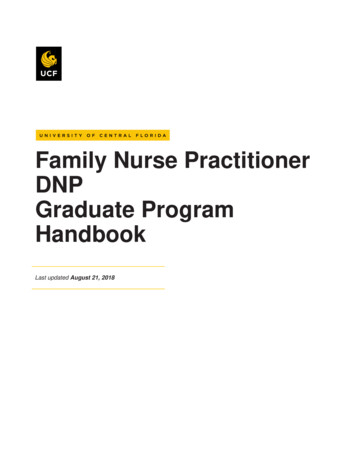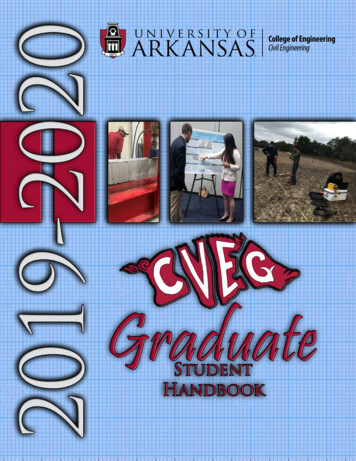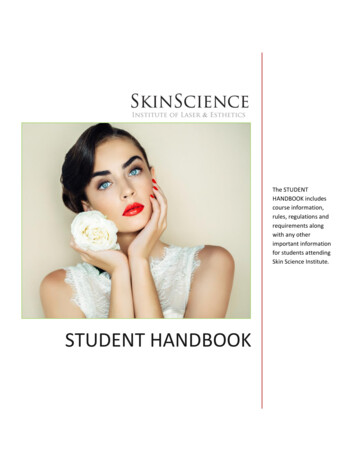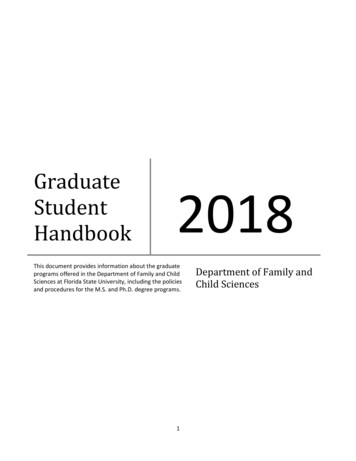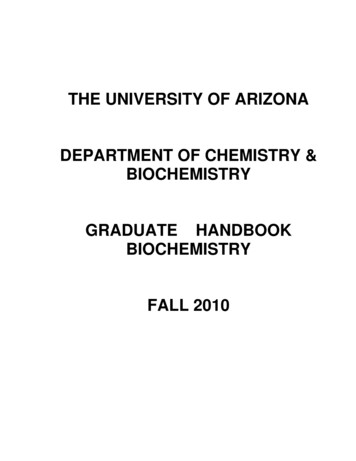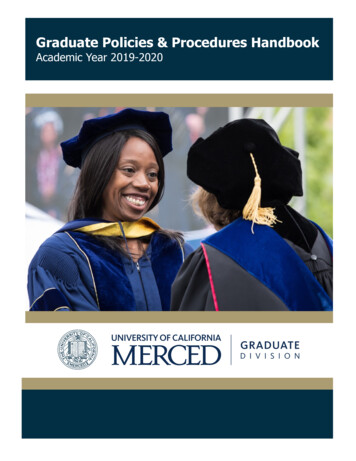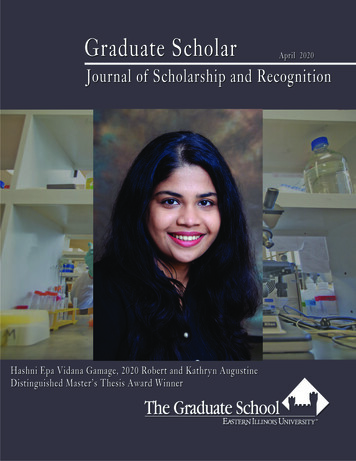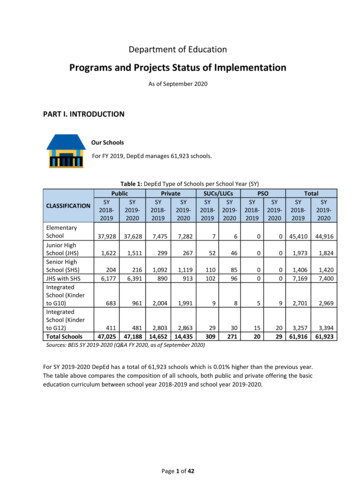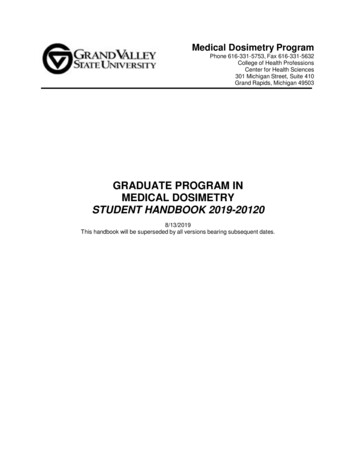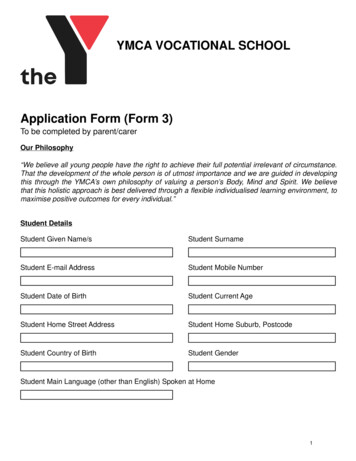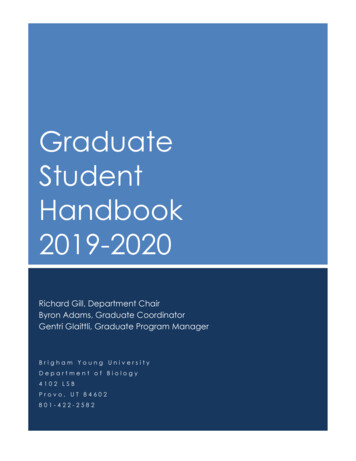
Transcription
GraduateStudentHandbook2019-2020Richard Gill, Department ChairByron Adams, Graduate CoordinatorGentri Glaittli, Graduate Program ManagerBrigham Young UniversityDepartment of Biology4102 LSBProvo, UT 84602801-422-25820 Page
Please carefully read over the information found within this handbook. Graduate students will beheld to the deadlines and requirements found within. The handbook is updated each year andtherefore should be carefully reviewed annually for changes to policies and procedures.
TABLE OF CONTENTSDepartment of Biology Staff . 1Department of Biology Faculty . 1degrees offered . 4general information . 4Honor Code Statement. 4Information . 5Acceptance Criteria. 5Application Deadline. 6Requirements for Admission . 6Credit Hour Requirements . 8Master’s Program (MS). 8Doctorate Program (PhD) . 8Transfer Credits . 8Registration Requirements . 8First Semester . 8Subsequent Years in Active Status . 9Final Semester . 9Eligibility for On-Campus Employment. 9Deferring the Graduate Program . 10Leave of Absence . 10Student Progress . 10Requirements and Deadlines . 10MS Degree:. 11PhD Degree:. 11i Page
Biannual Evaluations . 12Guidelines for Progress . 13Program Requirements. 14Program of Study and Selection of Advisory Committee . 14Program of Study . 14Selection of Advisory Committee . 14Change of Program of Study or Advisory Committee. 15Program of Study or Advisory Committee Member Change . 15Changing Committee Advisor. 15Prospectus . 16Comprehensive Oral Exam . 16MS Program: . 17PhD Program: . 17Defense of Research. 18Final Thesis/Dissertation Defense . 18Graduation . 20Thesis/Dissertation Format . 21Thesis/Dissertation Options . 21Review and Approval Procedures . 22Preparation for Binding . Error! Bookmark not defined.Forms and Fees Required . Error! Bookmark not defined.MS Students: . Error! Bookmark not defined.PhD Students: . Error! Bookmark not defined.Departmental Funding Guidelines. 24Tuition Benefits . 24MS Students: . 24ii P a g e
PhD Students: . 24Insurance Awards . 24MS Students: . Error! Bookmark not defined.PhD Students: . 24Teaching or Research Assistantship Positions . 25MS Students: . 25PhD Students: . 25Travel Funds . 25Procedure: . Error! Bookmark not defined.Scholarship Awards. 25External Funding Guidelines . 26Office Space . 271st Floor Space: . Error! Bookmark not defined.6th Floor Space: . Error! Bookmark not defined.Current Biology Graduate Courses. 28Department Forms . 30University Forms . 30iii P a g e
ORGANIZATION OF THE DEPARTMENTThe Department of Biology is 1 of 7 departments in the College of Life Sciences. Within thedepartment there are 26 full-time faculty and 3 full-time staff.DEPARTMENT OF BIOLOGY STAFFStephanie Burdett. Biology 100 Coordinator. Coordinates the teaching of all Bio 100 sections. If youwould like to TA or teach a section of Bio 100, work with your advisor and Stephanie. 2056B LSB. 801422-4339. stephanie burdett@byu.eduNicole Cuthbert. Biology Office Manager. Works with all faculty and undergraduate students in theDepartment of Biology. See her regarding any questions on classroom scheduling and addingcourse sections. 4104 LSB. 801-422-7389. nicole.cuthbert@byu.eduGentri Glaittli. Biology Graduate Program Manager. Works with all graduate students and theiradvisors. Meet with her for any questions regarding requirements, deadlines, forms, policies, andprocedures. 4101 LSB. 801-422-7137. gentri@byu.eduJim Wooten. Biology Financial Manager. Works with all faculty and students regarding financialtransactions. Any financial or travel questions should be directed to him. 4106 LSB. 801-422-4412.jim wooten@byu.eduDEPARTMENT OF BIOLOGY FACULTY*Faculty members with an asterisk are approved to be graduate committee chairs and committeemembers.*Byron J. Adams. Comparative phylogeography; evolution of virulence; host-pathogencoevolution; soil ecology; molecular systematics and evolution; speciation and species concepts;food web assembly; biodiversity; ecosystem functioning. 4127 LSB. 801-422-3132.byron adams@byu.edu*Elizabeth G. Bailey. Gender gaps in biology education; reciprocal peer tutoring; course structuresthat promote growth mindset; cumulative assessment; integration of math and biology; membranebiophysics. 4146 LSB. 801-422-0871. liz bailey@byu.edu*Mark C. Belk. Terrestrial and aquatic ecology; ecology of fishes; native fish conservation; fisheries;burying beetles; parasites; life-history responses to biotic and abiotic perturbations; predation andcompetition in size-structured populations; adaptation of organisms to local environments in termsof habitat use, coloration, and acoustic signals. 4023 LSB. 801-422-4154. mark belk@byu.edu*Seth M. Bybee. Entomology; evolutionary biology; systematics; bioinformatics; phylogenetics;dragonflies; visual evolution. 4057 LSB. 801-422-3152. seth.bybee@byu.edu1 Page
*Shawn M. Clark. Museum curation of insect collections; insect systematics. 3101E MLBM. 801-4223815. shawn clark@byu.edu*Richard A. Gill. Global change biology; community responses to climate variability; ecosystemecology; plant physiological ecology; evolution; biogeography. 4101A LSB. 801-422-3856.rgill@byu.edu*Blaine D. Griffen. Behavioral ecology; physiological ecology; population and community ecology;marine biology and ecology; conservation biology; extinction; zooplankton, crabs, shrimp, polarbears. 2121 LSB. 801-422-5930. blaine griffen@byu.edu*Jaime L. Jensen. Biological science education; evolution education and acceptance; effectivepedagogical strategies to increase scientific reasoning skills; pedagogical manipulations;pedagogical preparations; inquiry teaching; educational assessment. 4059 LSB. 801-422-6896.jamie.jensen@byu.edu*Jerald B. Johnson. Evolutionary ecology; ecological speciation; life history evolution; evolution ofmating and reproductive strategies; behavioral ecology; biological statistics; phylogeography;natural history and molecular systematics of desert fishes and tropical freshwater fishes. 4033 LSB.801-422-4502. jerry.johnson@byu.edu*Leigh A. Johnson. Plant systematics; taxonomy; phylogenetic inference; species delimitation;phylogeography; morphology; evolution; conservation genetics; population genetics. 4058 LSB.801-422-5241. leigh johnson@byu.edu*Robert L. Johnson. Plant systematics and taxonomy; floristics; plant-insect interactions. 3115AMLBM. 801-422-7094. robert johnson@byu.edu*John S. K. Kauwe. Bioinformatics; genetics of human disease; relationship between genotype andphenotype; genetic risk factors for Alzheimer’s disease; prevention, diagnosis, and genetic basis ofrheumatic heart disease; population genetics of aquatic organisms in the Western United States.4102 LSB. 801-422-2993. kauwe@byu.edu*Roger T. Koide. Physiological, population, and community ecology of plants and associated fungi,including mycorrhizal and endophytic fungi, and bacteria in natural and agricultural ecosystems;gut microbiomes of vertebrates and insects; agricultural ecology; global change biology. 4031 LSB.801-422-6650. rogerkoide@byu.edu*Steven D. Leavitt. Fungal symbioses; evolutionary diversification; molecular systematics andphylogenomics; role of species interactions within an evolutionary context; fungal symbioses;lichens; holobionts; biomonitoring and climate change; conservation; biogeography and diversityin arid or extreme habitats; scientific education; outreach. 4143 LSB. 801-422-4879.steve leavitt@byu.edu*C. Riley Nelson. Natural history; entomology; freshwater ecology; taxonomy; systematics; ecology;evolution; insect biodiversity in aquatic and desert habitats; environmental stewardship;biomonitoring; development of field guides; popularization of science; science education. 2119LSB. 801-422-1345. rileynelson@byu.edu2 Page
*Samuel H. Payne. Bioinformatics; cancer biology; proteomics; protein function. 4029 LSB. 801-4226652. sam payne@byu.edu*Steven L. Peck. Spatial processes in ecology and population biology from both applied andtheoretical perspectives, specifically in understanding how spatial dynamics influence the spreadof insecticide resistance; the effect of gene flow of evolution and speciation; philosophy and historyof biology; biomathematics; simulation modeling; philosophy of simulation; evolution andphilosophy; evolution and theology; bioethics. 4145 LSB. 801-422-4145. steven peck@byu.edu*Stephen R. Piccolo. Bioinformatics; genomics; human disease (especially cancers); medicine; datascience; transcriptomics. 4056 LSB. 801-422-7116. stephen piccolo@byu.edu*Russell B. Rader. Freshwater ecology; evolutionary biology; processes that determine stream andwetland community structure; ecology and evolution of biological invasions; spatial and temporalvariation in stream drift; trout-invertebrate interactions; wetland bio assessment; restoration;conservation. 4025 LSB. 801-422-9159. russell rader@byu.edu*Perry G. Ridge. Bioinformatics; computational biology; genetics; human disease. 4126 LSB. 801-4227564. perry.ridge@byu.edu*Beverly L. Roeder. Anatomy; animal disease physiology; regenerative medicine; biomedicalresearch; medicine and surgery; animal health, prevention and diagnosis of metabolic disorders;stable isotope techniques to understand Great Basin rattlesnake and temporal movements; thephysiologic and nutritional ecology of bears. 2120 LSB. 801-422-6873. beverly roeder@byu.edu*Duke S. Rogers. Phylogenetic systematics and evolution of mammals; conservation biology;phylogeography; biodiversity. 2103C MLBM. 801-422-5898. duke rogers@byu.eduJoshua A. Stowers. Biology teaching. 2122 LSB. 801-422-0873. josh stowers@byu.edu*Clinton J. Whipple. Genetic mechanisms that determine plant morphology; evolution of plantdevelopment; focus on grasses including agronomically important traits in cereals such as maize,barley, and rice. 4027 LSB. 801-422-9293. whipple@byu.edu*Michael F. Whiting. Entomology; bioinformatics evolution; systematics; phylogeny of insects basedon molecular and morphological evidence with emphasis on reconstructing the insect tree of life;computational phylogenomics; molecular evolution of insect vision; deciphering early patterns ofinsect diversification. 4142 LSB. 801-422-5651. michael whiting@byu.eduEdward R. Wilcox. DNA sequencing and instruments. 4046A LSB. 801-422-3647.edward wilcox@byu.eduTo see more information about the above faculty, please see http://biology.byu.edu/Faculty-andStaff3 Page
GRADUATE PROGRAMDEGREES OFFEREDGraduate degrees offered in the Department of Biology are a MS in Biology, MS in BiologicalScience Education, and PhD in Biology. There is no teacher certification program in our BiologicalScience Education master’s program, but certification is possible through Utah’s Alternative Routesto Licensure (ARL) program.GENERAL INFORMATIONThe guidelines in this handbook have been prepared for graduate students in the Department ofBiology and must be used in conjunction with those contained in the Graduate Catalog and thegraduate section of the General Catalog. Graduate students must stay informed about changesmade to guidelines each year at both the department and university level. It is ultimately thestudent’s responsibility to be in compliance with all department and university regulations. Studentswill be required to sign and submit a contract each year stating that they are familiar with thecurrent requirements. Forms for exceptions to policy are available from the graduate programmanager or online through the Graduate Studies website. Petitions must be signed by the chair ofthe advisory committee, the department graduate coordinator, department chair, and the collegedean prior to being submitted to the Graduate Studies office.HONOR CODE STATEMENT“We believe in being honest, true, chaste, benevolent, virtuous, and in doing good to all men . . . Ifthere is anything virtuous, lovely, or of good report or praiseworthy, we seek after these things”(Thirteenth Article of Faith).As a matter of personal commitment, the faculty, administration, staff, and students of BrighamYoung University, Brigham Young University-Hawaii, Brigham Young University-Idaho, and LDSBusiness College seek to demonstrate in daily living on and off campus those moral virtuesencompassed in the gospel of Jesus Christ, and will: Be honest.Live a chaste and virtuous life.Obey the law and all campus policies.Use clean language.Respect others.Abstain from alcoholic beverages, tobacco, tea, coffee, and substance abuse.Participate regularly in church services.Observe Dress and Grooming Standards.Encourage others in their commitment to comply with the Honor Code.4 Page
Specific policies embodied in the Honor Code include (1) the Academic Honesty Policy, (2) theDress and Grooming Standards, (3) the Residential Living Standards, and (4) the Continuing StudentEcclesiastical Endorsement Requirement. (Refer to institutional policies for more detailedinformation.)APPLICATION AND ADMISSIONINFORMATIONOur admissions criteria for graduate students coincide with the criteria currently published in theBYU Graduate Catalog, College of Life Sciences, as well as the Graduate Council’s Principles andCharacteristics of Graduate Education. Pursuant to this, the following basic guidelines are used:a. All applicants are required to have a minimum cumulative GPA of 3.0 on a 4.0 scalefrom their undergraduate degree.b. No graduate candidate can be accepted unless he or she has a faculty member in thedepartment who is willing to serve as the committee advisor to that student. The facultymember must be within the Department of Biology and approved for Graduate FacultyStatus (see previous list of Department Faculty) according to the department andcollege guidelines.ACCEPTANCE CRITERIAAcceptance is based on a balanced consideration of several areas including:a. GPA (cumulative) for completed undergraduate degree. Coursework will be analyzedby the department based on all classes taken. Successful candidates typically have anundergraduate GPA of 3.5 or better.b. English proficiency for international applicants as assessed through one of theacceptable English proficiency tests (TOEFL, E3PT, IELTS, or CAE).c. Each candidate is required to submit 3 letters of recommendation from associates whohave some understanding of the applicant’s abilities in relationship to the requirementsof the graduate program. Preference will be given to those with a scientific backgroundand/or those with advanced degrees with whom the candidate worked closely.d. Strong consideration will be given to those candidates with professional experience inthe field of biology whether it is work, internships, or research. This experience couldinclude special projects that resulted in publication and/or presentations at professionalmeetings.e. A clearly defined statement of intent. The statement of intent should include areas ofresearch interest as well as research ideas, career goals, and a preferred advisor.f. No student can or will be accepted unless he or she has a faculty member in thedepartment who is willing to serve as the committee advisor to the student. It is highlyrecommended to contact faculty in the department prior to application.5 Page
g. There is no “Provisional Status” category for the department; students are either qualifiedto be admitted or will be denied. Those requiring an exception to University guidelineswill be accepted on a Provisional Status at the university level.APPLICATION DEADLINEa. Graduate student applications are evaluated once per year for admission into the FallSemester.b. Applications are due through the BYU Graduate Studies website no later than January15th. Acceptances are generally sent out by early March.REQUIREMENTS FOR ADMISSIONa. A complete application must be submitted through the BYU Graduate Studies websiteno later than January 15th of each year. A complete application will include thefollowing components:a. The filled out online application.b. Desired Advisor: State a preferred advisor. The applicant should make contactwith their desired advisor prior to submitting their application.c. 3 Letters of Recommendation. Preference is given to letters that are written bythose with a scientific background and/or those with advanced degrees withwhom the candidate worked closely.d. Statement of Intent: The statement of intent should clearly define areas ofresearch interest as well as research ideas, career goals, and a preferred advisor.e. Resume (optional)f. 50 Application Fee paidg. All unofficial transcripts submitted. Students must upload an unofficial transcriptor academic record for each institution attended (even if a degree hasn’t beenreceived yet) when completing the online application. If recommended foradmission, official transcripts will need to be sent to Graduate Studies. Acceptedinternational applicants must initiate and complete the IERF foreign credentialevaluation report.b. Applicants must agree to maintain the University’s Honor Code.c. Applicants must receive an ecclesiastical endorsement.d. Applicants must have at least a baccalaureate degree from an accredited U.S.university or the equivalent from an international university (a 4- or 5-year program)before matriculation. The Graduate Studies office must receive an official transcriptshowing that the degree has been awarded. Study at BYU cannot continue past the firstsemester of a graduate program without BS verification.e. Applicants who are applying to the PhD program and are currently finishing a MSdegree must have completed the MS degree by start of fall semester. If the MS degreeis not completed by this time, the admissions offer will be withdrawn. The applicant canreapply for the following admissions cycle.f. Applicants must receive at least a 3.0 undergraduate cumulative GPA. All classes takenafter the BS degree will not be counted in this undergraduate GPA but will be6 Page
considered along with the application. Applicants with a GPA below a 3.00 may beprovisionally admitted.g. For applicants with English as a second language, they must submit the minimumrequired scores for one of the following acceptable English Proficiency Exams(applicants with scores below the minimum required may be provisionally admitted):a. CAEi. Minimum score of 185 (or grade of C)b. E3PTi. Overall minimum score of 79 (with minimum subscores of 21 in Speaking,Reading, and Listening, and a minimum subscore of 16 in Writing)c. IELTSi. Overall minimum band score of 7.0 (minimum band subscore of 6.0 ineach module)d. TOEFL (paper-based)i. Minimum score of 580e. TOEFL iBT (internet-based)i. Overall minimum score of 85 (with minimum subscore of 22 in Speaking,and minimum subscores of 21 in Listening, Reading, and Writing)Note: CAE, E3PT, IELTS, and TOEFL scores must be less than 2 years old at the time ofenrollment.*Students applying to more than one program on campus must submit a separate and completeapplication, including fee, for each program. Additional submission of scores is not required.7 Page
DEGREE REQUIREMENTSCREDIT HOUR REQUIREMENTSMASTER’S PROGRAM (MS) 30 credit hours (24 coursework hours and 6 thesis hours); 20 hours must be 500 level orabove.No more than a total of 10 hours from non-degree, senior, and/or transfer credit can beapplied toward the MS program. No Independent Study courses can be used.Undergraduate credit can only be used by a MS student upon approval. Graduate Studiesallows up to 9 undergraduate credits (only 300 and 400 level courses) if they pertain to thearea of study. Courses cannot count towards the BS degree requirements and be appliedto the MS degree.More information can be found in the current Graduate Catalog under “Credit Policies.”DOCTORATE PROGRAM (PHD) 54 credit hours (36 coursework hours and 18 dissertation hours)No undergraduate coursework may apply to the doctoral program of study (100-400 level).Up to 18 hours of master’s coursework may apply towards the required 36 hours. Theadvisory committee must approval all transfer courses from the MS transcript. All transferhours must be within the field of study.TRANSFER CREDITS Must be a graduate level course to transfer to a graduate program; no independent study.Must have received a B grade or better; no “P” grades.No more than 10 credit hours for MS students or 18 hours for PhD students may transfer.No international credits can be transferred without certification by examination.REGISTRATION REQUIREMENTSFIRST SEMESTER New students (MS and PhD) are required to enroll in at least 2 credit hours during the firstsemester or term in which they are admitted. The department encourages new students toenroll in at least 6 credits hours during their first semester.Recommended courses:o Bio 503—Research Orientation (1.0): Required for MS students, optional for PhD.8 Page
Bio 691R—Graduate Seminar Series (0.5): MS students are required to take this classat least 2 semesters and PhD students must enroll for 4 semesters; all graduatestudents are encouraged to take this course as many semesters as possible.Attendance at university forums and devotionals is expected during the duration of thegraduate program.o SUBSEQUENT YEARS IN ACTIVE STATUS University full-time status is 9 credit hours for graduate students.Doctoral students must satisfy a residency requirement of two consecutive semesters of 6credit hours each.Minimum registration is 6 credit hours in an academic school year (September-August) afterall coursework is completed. If 6 credit hours are not completed in any academic year, thestudent will be automatically dropped from the program. There is a 600 nonrefundable reenrollment fee to apply to resume graduate study.During the first term and last term in the program, students must register for at least 2 credithours.FINAL SEMESTER All students are required to enroll in at least 2 credit hours during the semester or term theygraduate; there are no exceptions.o Fall: 2 hourso Winter: 2 hourso Spring: 2 hourso Summer§ 1 hour Spring & 1 hour Summer, OR§ 2 hours Spring, OR§ 2 hours SummerStudents wishing to graduate in December must have a current ecclesiastical endorsement(even if all requirements are satisfied prior to the start of the Fall semester). Ecclesiasticalendorsements are due in March for the following academic year.ELIGIBILITY FOR ON-CAMPUS EMPLOYMENT U.S. Citizens and Permanent Residentso Graduate students must be enrolled in at least 2 credit hours during the semester inwhich they are employed on campus (including all RA and TA positions).o Graduate students enrolled for the upcoming Fall semester may work during Springand Summer terms without enrolling for courses; however, FICA taxes will bededucted from students’ paychecks if they are not enrolled in at least 1 credit hourduring Spring and Summer terms.International Students9 Page
ooInternational students must be enrolled in 9 credit hours each semester and 4.5credit hours each
As a matter of personal commitment, the faculty, administration, staff, and students of Brigham Young University, Brigham Young University-Hawaii, Brigham Young University-Idaho, and LDS Business College seek to demonstrate in daily living on and off campus those moral virtues encompassed in the gospel of Jesus Christ, and will: Be honest.
